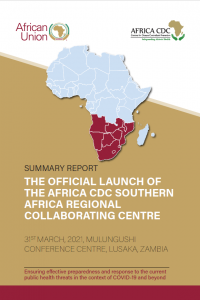
Summary Report: The Official Launch of the Africa CDC Southern Africa Regional Collaborating Centre
Response
Description
The Africa Centres for Disease Control and Prevention (Africa CDC) launched its Southern Africa Regional Collaborating Centre (SA-RCC) on 31st March 2021, from 9:00 am to 1:00 pm at Mulungushi Conference Centre in Lusaka, Zambia. The lunch was organised by the Southern Africa RCC in collaboration with the Ministry of Health (MoH) of the Republic of Zambia under the auspices of Dr. Kennedy Malama, Permanent Secretary of the MOH of the Republic of Zambia, and Chair of the organizing committee.The overall objective of the launch was to highlight the technical support and planned initiatives for the Southern Africa Region that include Health Security, information sharing, policy dialogue, regional collaboration and partnership, and challenges affecting the Member States, as well as coordination across borders in the context of COVID-19 and beyond.The launch was well attended, and officially declared open by Her Excellency, Mrs. Inonge Mutukwa Wina, the Vice President of the Republic of Zambia, and supported by His Excellency Moussa Faki Mahamat, Chairperson of the African Union Commission, represented by Mrs. Josefa Leonel Correia Sacko, the Commissioner for Rural Economy & Agriculture. Other participants in attendance include Hon. Dr. Jonas Chanda, MP, Minister of Health of the Republic of Zambia; Ministers from the Southern Africa Region; Her Excellency, Amira Elfadil Mohammed Elfadil, Acting Commissioner for Health, Humanitarian Affairs and Social Development, – and over 6,000 persons who attended the launch, majority of them virtually via Africa CDC Twitter Handle and Facebook page. Also in attendance were representatives from WHO, UNICEF, US-CDC, AU-SARO, RECs and SADC, Public Health England, World Bank, COMESA, AMERA, and EFENET in Zambia (See ANNEX 3).The meeting concluded by requesting the Southern Africa RCC to present the findings of the Role of Regional public health institutions in improving disease surveillance and response in the region; introduce the framework of the Regional Integrated Surveillance and Laboratory Networks (RISLNET); organize a high-level regional meeting to improve cross border surveillance in the context of health security; organize a Technical Advisory Committee (TAC) meeting, and encourage African Union Member States that don’t have National Public Health Institute to establish one (See the table on agreed action points in No. 9 below)
